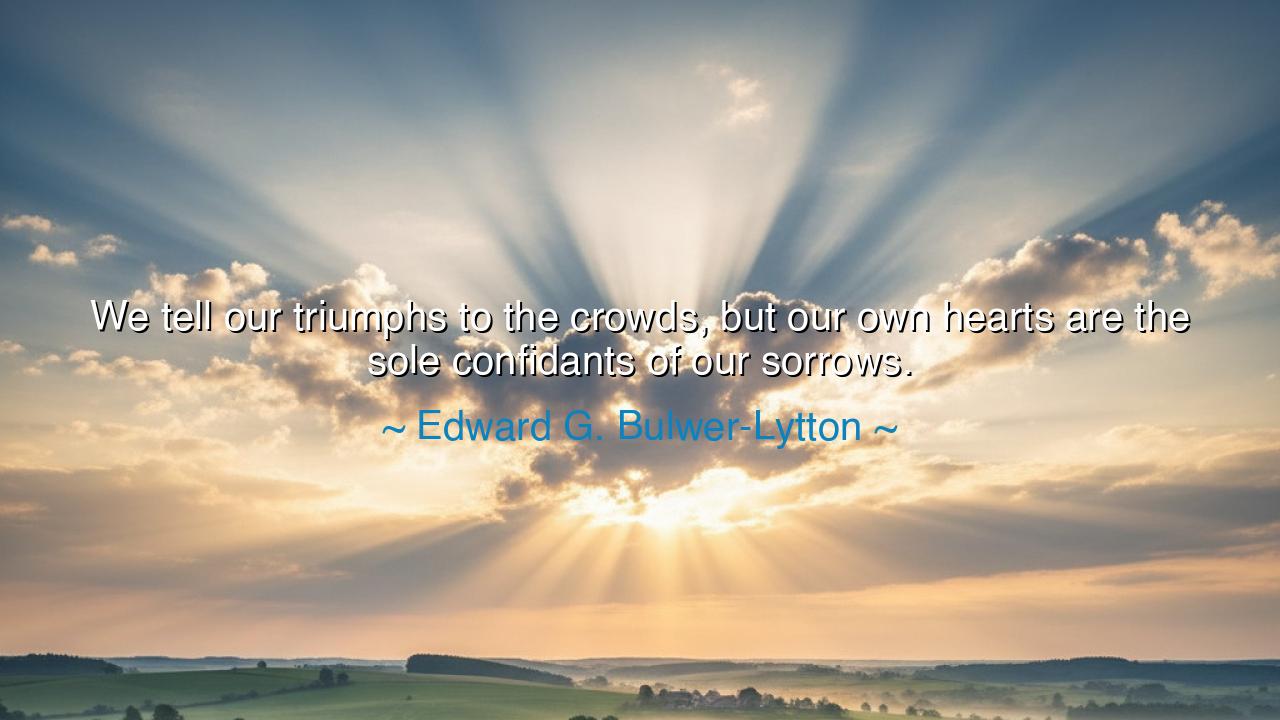
We tell our triumphs to the crowds, but our own hearts are the
We tell our triumphs to the crowds, but our own hearts are the sole confidants of our sorrows.






“We tell our triumphs to the crowds, but our own hearts are the sole confidants of our sorrows.” — thus wrote Edward G. Bulwer-Lytton, a man whose pen danced between romance and truth, between the glory of success and the solitude of pain. In this line, he unveils one of the most profound truths of the human spirit: that joy seeks expression, but sorrow seeks silence. We share our victories with the world because they bring us honor and belonging; yet our grief, being sacred and tender, hides within the chambers of the heart, where only the soul dares to listen.
To the ancients, such wisdom would have rung like the voice of an oracle. The poets of old — from Homer to Virgil — spoke of heroes who returned from battle to the cheers of the people, yet wept alone when the songs were over. Triumph is public; suffering is private. The warrior stands before the multitude to receive laurels, but in the night, beneath the stars, he kneels to weep for what victory cost. For in every triumph there is a hidden shadow — a price unseen by those who celebrate. Thus, Bulwer-Lytton reminds us that while the world loves the light of our achievement, it seldom understands the darkness from which it arose.
The author himself, a man of both fame and controversy, understood this duality deeply. Known for his novels and political career, he was admired by many, yet haunted by personal sorrow — estrangement, loneliness, and the burden of expectation. It was from this experience that his words were born. When he wrote of the heart as the sole confidant of sorrow, he spoke not as a philosopher detached from life, but as a man who had worn both the crown and the chain. He knew that pain often finds no listener, for grief is not a performance to be witnessed but a wound to be tended in silence.
Consider the story of Abraham Lincoln, whose name echoes through history as a symbol of justice and strength. To his people, he was the great liberator — the voice of freedom, the shepherd of a divided nation. But in private, he carried deep melancholy. Friends said his eyes bore “the sadness of a soul that had seen too much.” His triumph — the preservation of a nation — was celebrated by millions, yet the sorrow that accompanied it remained known only to his heart. His laughter before others was gentle and brief, but in solitude, he wrestled with the weight of every lost life, every broken family, every sacrifice made for his vision of unity. Such is the loneliness of the noble spirit — that it bears its sorrow in silence, lest the world misunderstand it.
Bulwer-Lytton’s words also speak to the nature of human vulnerability. To reveal joy is safe; it invites connection. But to reveal sorrow is to expose the deepest part of oneself — the fragile truth that we are not always strong. Many conceal their pain not from pride, but from the fear that it will be dismissed or pitied. Thus, sorrow becomes the sacred prayer whispered to one’s own heart, where no judgment enters. Yet, paradoxically, it is this hidden grief that gives depth to our character. For those who suffer silently often develop compassion for others, seeing in each soul the reflection of their own hidden ache.
And yet, the wisdom of this quote does not demand that we carry our sorrows forever alone. It teaches instead that the first listener of sorrow must be the self. Before one can confide in others, one must learn to sit with one’s pain — to understand it, to honor it, to let it speak. Only then can sorrow transform into wisdom, and wisdom into peace. Like the ancient mystics who meditated in silence, we, too, must face our suffering not as enemies but as teachers. In doing so, we learn to bear the weight of existence with dignity and grace.
So, my child, remember this teaching: celebrate your triumphs with humility, but hold your sorrows with reverence. Do not rush to share your pain before you have understood it, nor fear solitude when it comes. For in the quiet conversation between your heart and your grief, you will find truths that the noise of the crowd can never reveal. Triumph will win you admiration, but sorrow — when embraced — will grant you wisdom. And in that wisdom, you will learn the sacred balance of life: that both joy and pain, though born apart, lead the soul toward the same eternal peace — the understanding of itself.






AAdministratorAdministrator
Welcome, honored guests. Please leave a comment, we will respond soon